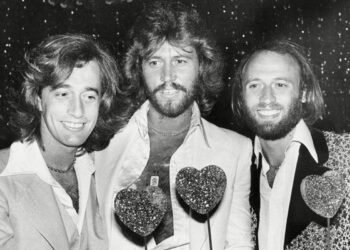How a New Doc Reclaims the Bee Gees’ Legacy
The Bee Gees created music for nearly five decades, but their legacy is often reduced to a brief period in the late Seventies when they became the most famous disco band on the planet thanks to the Saturday Night Fever soundtrack.
So when director Frank Marshall and producer Nigel Sinclair approached Barry Gibb for a documentary, the last living Bee Gee asked what they had in mind. “We said we wanted to reintroduce him to his audience, because time has passed,” Sinclair tells Rolling Stone. “He said, ‘If you guys will do that, I’ll give you everything.’”
The Bee Gees: How Can You Mend a Broken Heart, out December 12th on HBO, aims to tell the band’s whole saga from start to finish. It features rare footage and new interviews with Barry Gibb from his home in Miami, as well as interviews with his late brothers Robin and Maurice. Much of the footage was supplied by the Gibb family, who gave Marshall complete creative independence. “When we talked to [Maurice’s widow] Yvonne Gibb, she remembered that they had some eight-millimeter footage that was in a shoebox under a bed somewhere,” Marshall explains. “Talking to the family was really important.”
The film chronicles the band’s upbringing in Australia, their relationship with manager Robert Stigwood, their rise to fame in the late Sixties in England, and their global revival in the late Seventies with Saturday Night Fever, which stayed at Number One on the Billboard Album Chart for an astonishing 24 consecutive weeks. The group’s backing band and producers weigh in on the group’s creative process: keyboardist Blue Weaver tears up recalling how he and Barry came up with the melody for “How Deep Is Your Love,” while producers Albhy Galuten and Karl Richardson recreate the famous drum loop on “Stayin’ Alive.” “They went to the top of the mountain with the Bee Gees,” Sinclair says. “Then, as it happens with bands and engineers and producers, they moved on to another life. They were reliving this moment.”
Marshall also interviewed members of brother bands, including Oasis’ Noel Gallagher and Nick Jonas of the Jonas Brothers. They breakdown the joys of making music with family members, and the brutal tensions that comes with it. “When you’ve got brothers singing, it’s like an instrument that nobody else can buy,” Gallagher says. “You can’t go buy that sound in a shop.”
“We could have done a whole film just on Noel Gallagher’s interview,” Sinclair says. “Of all the projects that we’ve worked on, it was the one where everybody you asked would say yes. However famous people are, there’s all sorts of reasons why they don’t want to be interviewed. Eric Clapton doesn’t [usually] give interviews, so that was amazing.” Justin Timberlake also appears, praising the band to such extreme measures that he promises the cameramen he’s not high. “It was so fun to talk to him, I forgot we were doing the interview,” Marshall laughs. “He was so enthusiastic about them and their musical gifts.”
The film also delves into unpleasant moments in their career, from Robin getting booed offstage after his first solo show in 1970 to the backlash they faced following Disco Demolition Night in Chicago’s Comiskey Park nine years later. “Let’s all grow up, we’re just a pop group,” Barry urges in an archival interview. “I don’t think there’s any reason to chalk us up because we existed in the Seventies. And we would like to exist in the Eighties — does anybody mind if we exist in the Eighties? Thank you.” (In 1988, the band casually summed up their hatred of “Stayin’ Alive” to Rolling Stone: “We’d like to dress it up in a white suit and gold chains … and set it on fire.”)
However, the fiasco of the 1978 film Sgt. Pepper’s Lonely Hearts Club Band — starring the Bee Gees, Peter Frampton, and Steve Martin — isn’t mentioned at all in the documentary. “There was no reason to put it in,” Marshall says. Adds Sinclair: “We deal with other things that were challenges and some humiliating things that happened to them, but their experience there didn’t move their creativity forwards.”
In addition, the film only briefly touches on the Eighties and Nineties. “We do deal with it the last 10 minutes of the film,” Sinclair says, alluding to footage from their incredible One Night Only tour in 1997. “But we were trying to pick the mountaintop moments.”
The death of Maurice Gibb in 2003 and Robin Gibb in 2012 means that it now falls squarely on Barry to keep the legacy alive. He plays Bee Gees classics on occasional solo tours and in January he’s releasing the LP Greenfields: The Gibb Brothers Songbook, where he revisits many of their most iconic songs as duets with country stars. But memories of his brothers are never far from his head. “I honestly can’t come to terms with the fact that they’re not here anymore,” he says near end of the movie, staring out at the Miami skyline. “I’d rather have them all back here than no hits at all.”


